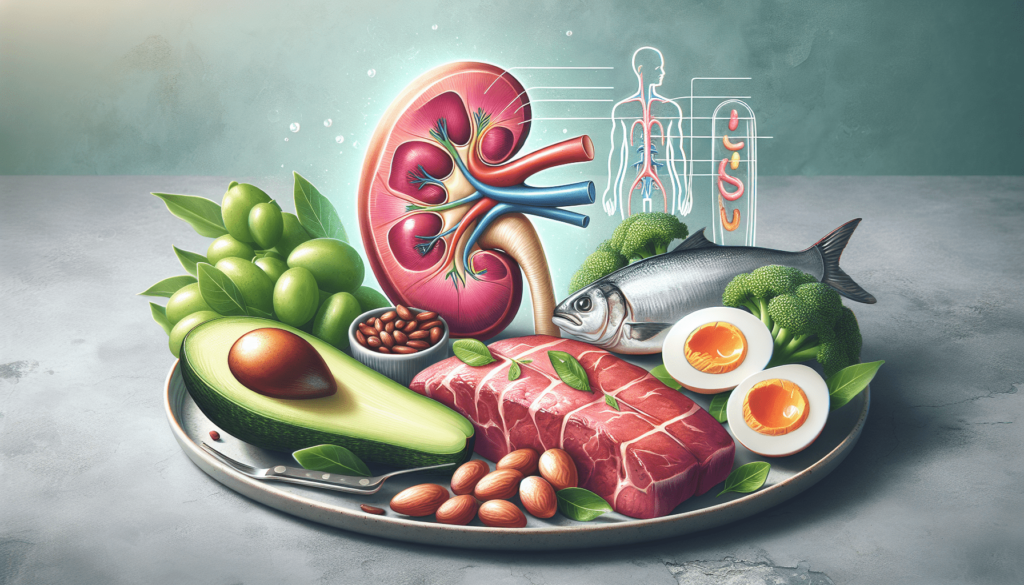If you’ve been considering starting the keto diet, you might have come across concerns about its impact on kidney health. In this article, we will delve into the relationship between the keto diet and kidney function, providing you with a comprehensive understanding of how this popular diet affects your kidneys. Whether you’re a beginner looking for guidance on getting started or someone who wants to deepen their knowledge of the keto lifestyle, we will explore the potential impact, benefits, and risks, ensuring you can make informed choices about your dietary journey. So, let’s dive in and uncover the truth about the keto diet and kidney health.
Introduction to the Keto Diet
Welcome to “Keto Diet and Kidneys: Understanding the Impact”. In this comprehensive article, we will delve into the fascinating world of the ketogenic diet and explore its effects on kidney health. Whether you are a beginner looking to learn more about keto or someone who wants to understand how the diet may impact your kidneys, this article has got you covered. So, let’s jump right in!
Explanation of the Keto Diet Principles
First things first, let’s understand what the keto diet is all about. The ketogenic diet, commonly known as the keto diet, is a high-fat, low-carbohydrate eating plan that has gained popularity in recent years. The main principle behind this diet is to drastically reduce your carbohydrate intake and replace it with fats. By doing so, you force your body into a metabolic state called ketosis, where it starts relying on fats for fuel instead of carbohydrates.
Benefits of the Keto Diet for Weight Loss
One of the primary reasons people opt for the keto diet is its potential for weight loss. By shifting your body’s fuel source from carbohydrates to fats, the keto diet can help you burn stored fat more efficiently. Additionally, the diet promotes a feeling of fullness, which can lead to reduced caloric intake and ultimately result in weight loss.
Popular Foods Consumed on the Keto Diet
So, what exactly can you eat on a ketogenic diet? While carbohydrates are significantly limited, there is still a wide variety of delicious and nutritious foods that you can enjoy. Some popular foods consumed on the keto diet include avocados, nuts and seeds, low-carb vegetables (such as broccoli and spinach), fatty fish (like salmon), meat and poultry, full-fat dairy products, and healthy oils (such as olive oil and coconut oil).

Overview of the Kidneys and Their Role in the Body
Now that we have a basic understanding of the keto diet, let’s shift our focus to the kidneys and their crucial role in the body. The kidneys are two bean-shaped organs situated on either side of your spine, below your ribcage. They play a vital role in maintaining overall health by filtering waste products, excess fluids, and toxins from your blood, which are then eliminated through urine.
Common Kidney Health Issues
Unfortunately, kidney health issues are relatively common and can range from mild to severe conditions. Some common kidney health issues include kidney stones, urinary tract infections, kidney infections, and chronic kidney disease. It is essential to prioritize kidney health and take necessary steps to prevent these issues from arising.
Factors That Affect Kidney Health
Several factors can impact kidney health, and it’s essential to be aware of them. Lifestyle factors such as smoking, excessive alcohol consumption, and a sedentary lifestyle can put a strain on your kidneys. Medical conditions like high blood pressure and diabetes can also contribute to kidney problems. Additionally, certain medications and a family history of kidney disease may increase the risk.
Understanding the Potential Impact of the Keto Diet on Kidneys
Now, let’s dive deeper into the topic at hand. Is the keto diet safe for your kidneys? The relationship between the keto diet and kidney health is a topic of ongoing research and debate. Some studies suggest that the diet may pose potential risks to kidney health, while others indicate no significant concerns. It is important to approach this matter with a balanced perspective and consider individual factors.

Research Studies on the Keto Diet and Kidney Health
Numerous research studies have explored the potential impact of the keto diet on kidney health. Some studies have found that a prolonged and strict adherence to the keto diet may lead to a condition called ketoacidosis, which can be harmful to the kidneys. However, it is crucial to note that these studies often involve extreme cases and may not be representative of the average person following a well-formulated keto diet.
Discussion on the Long-Term Effects of Keto on Kidneys
When considering the long-term effects of the keto diet on kidneys, it is essential to look at the overall health of an individual and not focus solely on the diet itself. Factors such as hydration, nutrient balance, and overall kidney function play an important role. Consulting with a healthcare professional and regularly monitoring kidney health is crucial for individuals on a long-term keto diet.
Explanation of Ketones and Their Relationship to the Keto Diet
To understand the potential impact of the keto diet on kidney health, we need to explore the role of ketones. Ketones are organic compounds produced by the liver when the body breaks down fats for fuel in the absence of carbohydrates. During ketosis, your body relies on these ketones as an alternative source of energy.
How Ketones Can Affect Kidney Function
While ketones are generally considered safe for individuals with healthy kidneys, there is evidence to suggest that excessive ketone production may stress the kidneys in certain circumstances. Ketones can alter the pH balance in the body, and prolonged acidosis can potentially lead to kidney damage. However, it is important to note that the body has mechanisms in place to regulate pH levels and maintain kidney function.

Potential Risks and Benefits of Ketones for Kidney Health
The relationship between ketones and kidney health is complex and context-dependent. In healthy individuals, moderate ketone production is generally well-tolerated and may even provide some benefits, such as improved insulin sensitivity. However, individuals with pre-existing kidney conditions or compromised kidney function should exercise caution and seek medical advice before adopting a ketogenic diet.
Link Between the Keto Diet and Kidney Stone Formation
One potential concern that often arises in discussions about the keto diet and kidney health is the potential link to kidney stone formation. Kidney stones are hard mineral and salt deposits that develop in the kidneys. Some studies suggest that the high protein intake and limited fluid intake associated with the keto diet could increase the risk of kidney stones.
Factors That Contribute to Kidney Stone Development on Keto
Several factors can contribute to kidney stone formation on the keto diet. Reduced fluid intake, especially if not adequately compensated, can increase urine concentration and promote stone formation. Additionally, a high intake of animal protein, such as red meat, can increase urine acidity and boost the excretion of substances that contribute to stone formation.
Preventive Measures for Reducing the Risk of Kidney Stones on Keto
If you are following a keto diet and want to reduce the risk of kidney stone formation, there are preventive measures you can take. It is crucial to stay hydrated by drinking plenty of water throughout the day. Adequate hydration can help dilute urine and prevent the accumulation of minerals and salts that contribute to stone formation. Additionally, incorporating lemon or citric acid into your diet can help increase urine citrate levels, which inhibits stone formation.

Protein Intake on the Keto Diet
Protein intake plays a significant role in the keto diet, as it is a primary source of nutrients and energy. However, there are concerns about high protein consumption and its potential impact on kidney health. Excessive protein intake, especially in individuals with pre-existing kidney conditions, can lead to increased stress on the kidneys.
How High Protein Consumption Affects Kidney Health
When you consume excess protein, it must be metabolized and eliminated by the kidneys. This process requires the kidneys to work harder, potentially leading to a strain on their function. In individuals with healthy kidneys, moderate protein consumption is generally well-tolerated. However, individuals with compromised kidney function should be mindful of their protein intake and consult with a healthcare professional.
Recommendations for Protein Intake on Keto to Maintain Kidney Health
To maintain kidney health while following the keto diet, it is important to consume an appropriate amount of protein. The general recommendation for protein intake on keto is around 0.6 to 1 gram of protein per pound of body weight. However, individual protein needs may vary based on factors such as activity level, age, and existing health conditions. Consulting with a registered dietitian or healthcare professional can help you determine the optimal protein intake for your specific needs.
Explanation of Electrolytes and Their Importance for Kidney Function
Electrolytes are minerals in your body that have an electric charge. They play a vital role in various bodily functions, including proper kidney function. The kidneys help regulate the balance of electrolytes in the body, ensuring they are within a healthy range. Key electrolytes include sodium, potassium, calcium, and magnesium.
How the Keto Diet Affects Electrolyte Balance
When you transition to a ketogenic diet, your body excretes more water and electrolytes due to reduced carbohydrate intake. This loss of electrolytes can disrupt the delicate balance and potentially impact kidney function. It is crucial to be mindful of your electrolyte intake and ensure you are replenishing them adequately while on the keto diet.
Tips for Maintaining Proper Electrolyte Balance on Keto
To maintain proper electrolyte balance while following the keto diet, there are a few tips you can follow. Firstly, make sure to consume electrolyte-rich foods such as avocados, leafy greens, nuts, and seeds. Additionally, consider incorporating mineral-rich beverages like bone broth and electrolyte supplements to help replenish electrolytes. Be sure to consult with a healthcare professional or registered dietitian for personalized recommendations based on your specific needs.
Signs and Symptoms of Kidney Issues on the Keto Diet
It is important to be aware of the signs and symptoms that may indicate kidney issues while on the keto diet. These may include frequent urination, changes in urine color or odor, persistent fatigue, swelling of the hands and feet, and persistent lower back pain. If you experience any of these symptoms or have concerns about your kidney health, it is important to seek medical advice promptly.
Regular Tests and Medical Check-Ups to Assess Kidney Function
To monitor kidney health while on the keto diet, regular tests and medical check-ups are essential. Tests such as blood urea nitrogen (BUN) and serum creatinine can provide valuable insights into kidney function. Additionally, urine tests can help detect any abnormalities. Working closely with a healthcare professional and staying proactive in monitoring kidney health can help detect potential issues early on.
When to Seek Medical Advice If Experiencing Kidney-Related Symptoms on Keto
If you are following the keto diet and experiencing kidney-related symptoms, it is crucial to seek medical advice promptly. It’s always better to be safe than sorry, and a healthcare professional can provide a proper evaluation of your symptoms and advise on the necessary course of action. Your kidneys are vital organs, and it is important to take any potential issues seriously.
Insights from Healthcare Professionals on the Keto Diet and Kidney Health
Now, let’s hear from healthcare professionals and their insights on the keto diet and its impact on kidney health. Many healthcare professionals believe that, in healthy individuals, the keto diet is generally safe and does not pose significant risks to kidney health when followed correctly. However, it is important to note that individual factors and pre-existing health conditions may impact how the keto diet affects kidney function.
Contrasting Opinions and Debates Surrounding the Keto Diet and Kidney Health
As with any diet or health-related topic, there are contrasting opinions and ongoing debates surrounding the keto diet’s impact on kidney health. Some experts argue that a well-formulated keto diet, with proper hydration and nutrient balance, is safe for kidney health. On the other hand, some express concerns about the potential risks, especially for individuals with pre-existing kidney conditions. Further research is needed to provide a conclusive understanding of this complex relationship.
Summary of the Impact of the Keto Diet on Kidney Health
In summary, the impact of the keto diet on kidney health remains a topic of debate, with varying opinions from healthcare professionals. While the keto diet has shown potential benefits for weight loss and overall health, it is crucial to prioritize kidney health and take necessary precautions. Monitoring kidney function, staying hydrated, consuming adequate protein, and maintaining proper electrolyte balance are key factors to consider while following the keto diet.
Tips for Maintaining Kidney Health While on Keto
If you choose to follow the keto diet, here are some tips for maintaining kidney health:
-
Stay hydrated: Drink plenty of water throughout the day to ensure adequate hydration and promote kidney function.
-
Monitor protein intake: Consume an appropriate amount of protein based on your individual needs and consult with a healthcare professional for guidance.
-
Replenish electrolytes: Be mindful of your electrolyte intake and consider incorporating electrolyte-rich foods and beverages or supplements.
-
Regularly monitor kidney function: Stay proactive in monitoring your kidney health by scheduling regular tests and medical check-ups with a healthcare professional.
-
Seek medical advice when needed: If you experience any kidney-related symptoms or have concerns, do not hesitate to seek medical advice promptly.
Final Thoughts on the Keto Diet and Its Influence on Kidneys
In conclusion, the impact of the keto diet on kidney health is a complex and dynamic topic. While the diet has potential benefits and has shown positive results for weight loss and other health markers, it is important to approach it with caution and prioritize kidney health. Consulting with a healthcare professional and regularly monitoring kidney function are crucial steps in ensuring a safe and healthy ketogenic journey. Remember, the key to a successful keto diet is balance, moderation, and personalized care.




